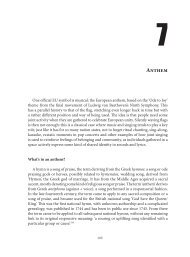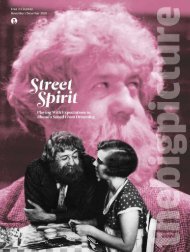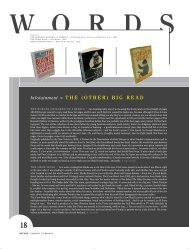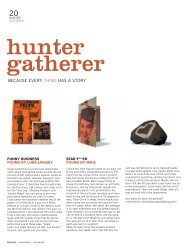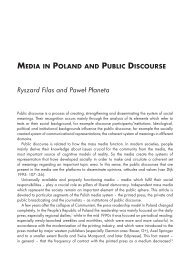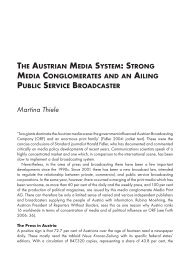Fan phenomena - Intellect
Fan phenomena - Intellect
Fan phenomena - Intellect
You also want an ePaper? Increase the reach of your titles
YUMPU automatically turns print PDFs into web optimized ePapers that Google loves.
<strong>Fan</strong> <strong>phenomena</strong><br />
Decoding cult subjects of popular culture<br />
Project Synopsis<br />
This new series is prompted by a growing appetite for books<br />
that tap into the fascination we have with what constitutes an<br />
iconic or cultish phenomenon and how a particular person, TV<br />
show or film character/film infiltrates their way into the public<br />
consciousness. We will look at particular examples of ‘fan culture’<br />
and approach the subject in an accessible manner aimed at both<br />
fans and those interested in the cultural and social aspects of<br />
these fascinating – and often unusual – ‘universes’.<br />
Each of the subjects we choose have massive visual appeal as they<br />
deal with fan fashion, memorabilia, (fan)homages, merchandising<br />
and branding that help to create the immersive world that extends<br />
beyond the phenomenon itself. The books will aim to exploit this<br />
visual aspect to align them with other <strong>Intellect</strong> book series such as<br />
the World Film Locations and Directory of World Cinema series that<br />
make good use of relevant collected imagery.<br />
The series aims to ‘decode’ cult subjects in terms of the appeal<br />
and far reaching connections each of them have in becoming part<br />
of popular culture. We are fully aware that these are not meant to<br />
be comprehensive, weighty tomes on the subject – rather a series<br />
of ‘handy’ books that each include a fascinating collection of texts<br />
and accompanying imagery which explore a particular area or<br />
aspect of the subject’s ‘universe’ in each section.<br />
important to remember:<br />
These books are aimed at both fans and those interested in the<br />
cultural and social aspects of these fascinating ‘universes’<br />
These books are meant to be entertaining, informative and<br />
jargon free guides to each <strong>phenomena</strong><br />
The book series acts as a more visual, broadly accessible and<br />
more topic specific accompaniment to our own Journal of <strong>Fan</strong>dom<br />
Studies due in 2013.<br />
<strong>Intellect</strong> Ltd. The Mill, Parnall Road, Fishponds, Bristol, BS16 3JG, United Kingdom<br />
T: +44 (0) 117 9589910 / F: +44 (0) 117 9589911 E: info@intellectbooks.com<br />
intellect<br />
Proposed Titles<br />
Buffy the Vampire Slayer<br />
Star Trek<br />
X-Files<br />
James Bond<br />
Harry Potter<br />
Star Wars<br />
Dr. Who<br />
The Big Lebowski<br />
Sherlock Holmes<br />
Rocky Horror Picture Show<br />
Lord of the Rings<br />
The Matrix<br />
Marilyn Monroe<br />
Zombies<br />
James Dean<br />
Quentin Tarantino<br />
Anime<br />
Manga<br />
Gene Kelly<br />
Jane Austen<br />
Disney<br />
Audrey Hepburn<br />
Twin Peaks<br />
SuperheroeS:<br />
Batman<br />
Superman<br />
GanGSterS/mafia:<br />
The Godfather<br />
The Sopranos
<strong>Fan</strong> <strong>phenomena</strong><br />
Decoding cult subjects of popular culture<br />
Book Contents<br />
Basic structure<br />
Each book will be an edited collection of<br />
texts or essays which allows room for subject<br />
coverage specific to each <strong>phenomena</strong>. The<br />
series will retain an overarching consistency by<br />
book length (128 pages approx.), number of<br />
texts (approx. 10 per book + an editors into)<br />
and design (both cover and text templates).<br />
Suggested topics to cover in each book can<br />
be found on the next page. By examining<br />
these key aspects of the fan phenomenon, the<br />
reader can gain a nuanced appreciation for the<br />
content without being overwhelmed by the<br />
sheer magnitude of any particular social film/<br />
television movement. The essays will remain<br />
succinct and easily accessible, appealing to<br />
a wider audience instead of reinforcing the<br />
esoteric appeal of a densely worded, academic<br />
approach.<br />
<strong>Intellect</strong> Ltd. The Mill, Parnall Road, Fishponds, Bristol, BS16 3JG, United Kingdom<br />
T: +44 (0) 117 9589910 / F: +44 (0) 117 9589911 E: info@intellectbooks.com<br />
intellect<br />
Additional content<br />
What we would also like to<br />
include are interviews with fans<br />
that could act as essay ‘breaks’ and<br />
should relate to particular essays<br />
or topic strands. So, as examples:<br />
an interview with a writer of fan<br />
fiction or fan-film, an interview<br />
with an avid blogger, a creator of<br />
spin-off videogame, founder of<br />
tie-in philosophy (‘Dudeism’ as an<br />
example). Interviews could also<br />
be with celebrity fans discussing<br />
why a particular phenomenon<br />
has had such an impact on their<br />
lives. This would help to create<br />
a more accessible tone to the<br />
books and engage with the actual<br />
community of fans that we are<br />
discussing – potentially aiding in<br />
the marketability of the books.<br />
This additional content is not<br />
eseential but discussion about<br />
its possible inclusion can be had<br />
during the process of editing each<br />
book in the series.
<strong>Fan</strong> <strong>phenomena</strong><br />
Decoding cult subjects of popular culture<br />
Book Contents<br />
Suggested topics to cover<br />
FAShIon:<br />
This could appeal to the fan’s attempted appropriation of fashion<br />
or the proliferation of icons (eg Superman’s emblem selling millions<br />
of T-shirts), the fashion world’s reinterpration of cult trends,<br />
or a discussion of the cultural impact of style (from the simple<br />
and sauve instinct emphasized in James Bond to the gleeful<br />
anarchism of Rocky Horror Picture Show). The fan’s escapism and<br />
reinforcement of a film or show’s fictional universe with cosplay<br />
would be fascinating as well.<br />
FAn medIA:<br />
Looking at art, fan fiction, fan films, mashups, machinima and<br />
other examples of fan responses to a given ‘obsession’. This could<br />
show the ways in which fans can occasionally broaden the scope<br />
of the original source material. This section could also explore<br />
copyright infringement and cases where fan media is ‘blocked’ by<br />
the source material creators (George Lucas immediately comes<br />
to mind!).<br />
LAnguAge (parlance/slang/dialect/canon):<br />
You could take a few different approaches with this topic. You<br />
could focus on a literal fictional language (eg Star Trek or Lord<br />
of the Rings), focus on key terminology that a cult interest has<br />
inspired (for instance, Zed means zombie), or even focus on<br />
something as simple as body language (James Bond and the<br />
Dude from The Big Lebowski would be particularly interesting to<br />
analyze here). Important to focus here on how the source material<br />
has been translated, appropriated and developed on by fans.<br />
eConomICS:<br />
This can cover how a cult interest becomes a marketable entity,<br />
how characters are distilled into action figures, how a culture of<br />
attaining memorabilia rises in an attempt to maintain a tenuous<br />
bond with the devoted universe and how brand recognition/<br />
re-inforcement is created and sustained. Also, how companies<br />
use the pervasive quality of the cult culture to sell objects both<br />
directly related to the source material and completely unrelated.<br />
<strong>Intellect</strong> Ltd. The Mill, Parnall Road, Fishponds, Bristol, BS16 3JG, United Kingdom<br />
T: +44 (0) 117 9589910 / F: +44 (0) 117 9589911 E: info@intellectbooks.com<br />
intellect<br />
VIrTuAL:<br />
This would detail how the cult extends into the virtual world,<br />
detailing message board culture, videogame proliferation, the<br />
creation of avatars, apps, online MMORPG (massive multi-player<br />
online role playing games) and so on. Any and all attempts to<br />
sustain and experience the source material in digital form.<br />
InFLuenCe:<br />
Influence could go into reiteration of a film or show’s identity<br />
into another medium (James Bond becoming a raging homosexual<br />
in the 1963 Bond Strikes Camp), or perhaps how one<br />
cult movement inspires a series of cult movements to follow<br />
(Buffy the Vampire slayer as impetus for Twilight and True Blood) or<br />
weakly developed attempts at harnassing a cult trend (The Golden<br />
Compass trying to follow on the heels of The Lord of the Rings).<br />
This could also mention a reflexive process for fans who are also<br />
accomplished film and television writers (like Tarantino making a<br />
Marilyn Monroe reference in Pulp Fiction or The Venture Brothers<br />
opening up an episode with its characters in full Rocky Horror<br />
Picture Show drag).<br />
PhILoSoPhIeS:<br />
This topic could go into the basic philosophical themes and<br />
tenets a cult phenomenon cultivates, from the bliss of Bond<br />
deferring any major moral dilemma to cod philosophies such as<br />
Dudeism to the disturbing Disney family ethos. Also, it seems to<br />
be a benchmark for any cult phenomenon to justify some publication<br />
of proposed philosophical tenets subtly suggested through<br />
the course of a film or television series.<br />
ChArACTer/ChArACTerIzATIon:<br />
Character would deal with aspects of character identity within<br />
the subject material and with potential fan emulation, where they<br />
try to become the character or characters, to adopt specific mannerisms,<br />
divesting their own identities, etc.<br />
each book has room for flexibility in terms of essay inclusion but an effort should be made to<br />
explore as many of the topics listed above where possible.<br />
A coherent book outline should be submitted to us by the appointed editor at the start of the<br />
process, listing suggested essays in order to agree a working format.
<strong>Fan</strong> <strong>phenomena</strong><br />
Decoding cult subjects of popular culture<br />
Book Contents (continued)<br />
editor Introduction<br />
Outlining the scope of the particular volume<br />
and the aim of the book series in general.<br />
1200 words approx.<br />
essays<br />
Editors should commission 10 essays.<br />
(Essays can include sub-sections but must be<br />
broken down using sub-headings.)<br />
Essay contributors should provide<br />
accompanying images along with their final<br />
text - images should be of a high quality<br />
sufficient for print purposes (see content<br />
submission page for further details).<br />
Essays should be of a roughly similar text<br />
length: 3,000- 3,500 words each<br />
editor & Contributor Bios | 150 words each<br />
Further reading list<br />
Image credit list<br />
Bibliography<br />
*Written content should adhere to the <strong>Intellect</strong> style<br />
guides, copies of which can be sent through on request.<br />
Copy deadlines will be set once one is established<br />
between the editor and series editor Gabriel Solomons.<br />
<strong>Intellect</strong> Ltd. The Mill, Parnall Road, Fishponds, Bristol, BS16 3JG, United Kingdom<br />
T: +44 (0) 117 9589910 / F: +44 (0) 117 9589911 E: info@intellectbooks.com<br />
intellect<br />
Tone of voice and<br />
writing style<br />
It’s worth remembering that<br />
these books are aiming to target<br />
a new audience for <strong>Intellect</strong> that<br />
is not purely academic.<br />
The look and feel of the books<br />
will be attractive to a wider<br />
audience than just pure film/tv/<br />
fan culture aficionados.<br />
It’s therefore important to have<br />
this audience in mind when<br />
writing and commisioning<br />
content for these books. The<br />
content needs to be accessible<br />
and not use jargon that feels<br />
too esoteric: Finely written,<br />
intelligent and accessible<br />
books, eminently readable and<br />
unpretentious.<br />
The book series acts as a more<br />
visual, broadly accessible and<br />
more in-depth accompaniment<br />
to our own Journal of <strong>Fan</strong>dom<br />
Studies due in 2013.
<strong>Fan</strong> <strong>phenomena</strong><br />
Decoding cult subjects of popular culture<br />
editorial responsibilities<br />
Volume editors will need to operate as managers in terms of<br />
ensuring communication is clear and open and that deadlines are<br />
clearly set out - and met.<br />
Create and manage team of contributors<br />
These will include essay writers and any other specially<br />
commissioned writers.<br />
oversee content creation<br />
Volume editors are responsible for outlining the basic content<br />
structure for their book, which may include a specific list of essay<br />
titles and supplemetary content.<br />
Stick to deadlines<br />
Volume editors need to be aware of all deadlines in order to allow<br />
for necessary proofing and copy editing prior to final printing.<br />
utilise social networking and marketing strategies<br />
Title editors are encouraged to help ‘spread the word’ to promote<br />
a community of interested (and potentially) useful readers/<br />
followers.<br />
<strong>Intellect</strong> Ltd. The Mill, Parnall Road, Fishponds, Bristol, BS16 3JG, United Kingdom<br />
T: +44 (0) 117 9589910 / F: +44 (0) 117 9589911 E: info@intellectbooks.com<br />
intellect<br />
Key Words<br />
Facebook<br />
Twitter<br />
Blogger<br />
Mubi<br />
The Auteurs<br />
World Cinema Foundation<br />
Social networks<br />
Secret Cinema<br />
Key References<br />
Google:<br />
How to Use Facebook: 5 Tips For<br />
Better Social Networking<br />
ABC’s of Using Twitter<br />
Effectively<br />
What Is Social Networking?



